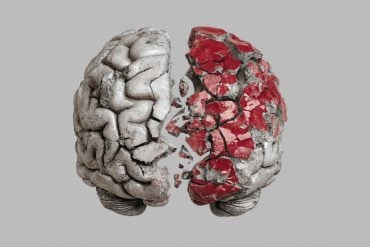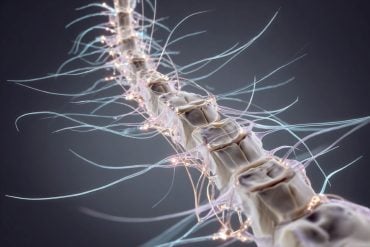Summary: Consuming a modified Mediterranean-ketogenic diet which consists of healthy fats and low carbs positively alters biological pathways associated with Alzheimer’s disease. Switching to a Mediterranean-keto diet could help reduce the risk of developing Alzheimer’s, particularly for those most at risk of developing dementia.
Source: Wake Forest University
Following a Mediterranean-based ketogenic diet may decrease the risk of Alzheimer’s disease, according to a new study from scientists at Wake Forest University School of Medicine.
In the study, researchers compared a low-fat diet with a diet consisting of healthy fats/protein and low carbohydrates—the modified Mediterranean ketogenetic diet—and found that the modified diet showed robust changes in a biological pathway that is linked to Alzheimer’s disease.
The findings were published online today in Alzheimer’s & Dementia: The Journal of the Alzheimer’s Association.
According to the Alzheimer’s Association, more than 6.5 million Americans are living with Alzheimer’s disease, and 1 in 3 seniors die with the disease or another form of dementia.
“We hope that better understanding this complex relationship between diet, cognitive status and gut health will lead to new interventions to prevent and treat Alzheimer’s disease,” said Suzanne Craft, Ph.D., professor of gerontology and geriatric medicine at Wake Forest University School of Medicine.
This study builds upon previous research from Craft’s team showing that a modified ketogenic diet may prove beneficial in the prevention of cognitive decline.
The randomized, single-site study involved 20 adults, nine diagnosed with mild cognitive impairment (MCI) and 11 with normal cognition. These participants were randomly assigned to follow either the low-carbohydrate modified Mediterranean-ketogenic diet or a low-fat, higher carbohydrate diet for six weeks then, after a six-week “washout” period, to switch to the other diet.
Stool samples were collected from participants at the beginning and end of each diet period, and six weeks after the washout of the second diet to analyze changes in gut microbiome—the good and bad bacteria that live in the gastrointestinal tract.

Researchers found that participants with MCI on the modified Mediterranean ketogenic diet had lower levels of gamma-aminobutyric acid (GABA) and of GABA-producing microbes. Participants on this diet also had higher levels of GABA-regulating bacteria. GABA is the primary inhibitory neurotransmitter in the central nervous system, and GABA dysfunction is associated with neuropsychiatric conditions including Alzheimer’s disease.
“Our study is the first to show that diet modulates GABA differently in MCI,” Craft said.
The study also showed that participants with MCI who had curcumin in their diets also had lower levels of BSH-containing bacteria. These bacteria regulate bile acids produced by the liver and gut. Lower levels suggest reduced gut motility, a phenomenon in which food and waste take longer to transit the gut. Abnormal bile acid profiles have been observed in adults with Alzheimer’s disease.
“These findings provide crucial insight into how diet may affect the microbiome and improve brain health,” Craft said. “Larger studies are needed to assess the role diet interventions play in patients with cognitive impairment.”
Funding: The study was supported by the Wake Forest Alzheimer’s Disease Research Center P30-AG072947, the Hartman Family Foundation, Roena B. Kulynych Center for Memory and Cognition Research, National Institute on Aging grants 5U19AG063744, 31U01AG061359-01, 1RF1AG059093, 1RF1AG057452 and R01AG046171 and RF1 AG0151550.
About this diet and Alzheimer’s disease research news
Author: Myra Wright
Source: Wake Forest University
Contact: Myra Wright – Wake Forest University
Image: The image is in the public domain
Original Research: Open access.
“Effects of a ketogenic and low-fat diet on the human metabolome, microbiome, and foodome in adults at risk for Alzheimer’s disease” by Suzanne Craft et al. Alzheimer’s and Dementia
Abstract
Effects of a ketogenic and low-fat diet on the human metabolome, microbiome, and foodome in adults at risk for Alzheimer’s disease
INTRODUCTION
The ketogenic diet (KD) is an intriguing therapeutic candidate for Alzheimer’s disease (AD) given its protective effects against metabolic dysregulation and seizures. Gut microbiota are essential for KD-mediated neuroprotection against seizures as well as modulation of bile acids, which play a major role in cholesterol metabolism. These relationships motivated our analysis of gut microbiota and metabolites related to cognitive status following a controlled KD intervention compared with a low-fat-diet intervention.
METHODS
Prediabetic adults, either with mild cognitive impairment (MCI) or cognitively normal (CN), were placed on either a low-fat American Heart Association diet or high-fat modified Mediterranean KD (MMKD) for 6 weeks; then, after a 6-week washout period, they crossed over to the alternate diet. We collected stool samples for shotgun metagenomics and untargeted metabolomics at five time points to investigate individuals’ microbiome and metabolome throughout the dietary interventions.
RESULTS
Participants with MCI on the MMKD had lower levels of GABA-producing microbes Alistipes sp. CAG:514 and GABA, and higher levels of GABA-regulating microbes Akkermansia muciniphila. MCI individuals with curcumin in their diet had lower levels of bile salt hydrolase-containing microbes and an altered bile acid pool, suggesting reduced gut motility.
DISCUSSION
Our results suggest that the MMKD may benefit adults with MCI through modulation of GABA levels and gut-transit time.






